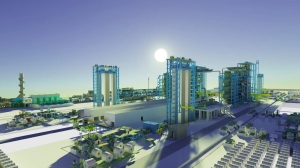


(Posted on 02/07/25)
Following the successful debt raising at the end of April 2025, SSAB has secured an additional EUR 430 million green financing to support its transformation project in Luleå, Sweden. The transformation project will establish a state-of-the-art mini-mill which plays a central role in repositioning SSAB Europe as a maker of premium products while significantly lowering costs and CO2 emissions. The latest financing is backed by the German Export Credit Agency Euler Hermes and complements earlier support from the Swedish National Debt Office (Riksgälden), Italian Export Credit Agency (SACE), and the Nordic Investment Bank. Crédit Agricole CIB structured the transaction.
SSAB’s EUR 4.5 billion investment in the new Luleå mini-mill was announced in 2024. The four green loan facilities total EUR 2.7 billion and are designed with long-term maturities that support the full project lifecycle. The financing package includes:
The loans are structured under the Green Loan Principles, in line with SSAB’s Green and Sustainability-linked Finance Framework.
“Securing this final piece of the financing marks a key milestone in our transformation journey,” said Leena Craelius, CFO of SSAB. “With this new green loan, we have now completed the financing package needed to deliver the Luleå transformation. It reflects strong support from our partners and the investment in Luleå will enable us to build an even stronger and more competitive SSAB by reducing costs, accelerating the product mix improvement and virtually eliminating all CO2 emissions from Luleå production.”
Crédit Agricole CIB has been acting as the Global Coordinator, Structuring Bank, and Green Loan Coordinator for the financing package.
The new mill will have a capacity of 2.5 million tonnes a year with two electric arc furnaces, advanced ladle metallurgy and an integrated rolling mill. The investment also includes a cold rolling complex, advanced galvanizing, as well as continuous annealing and is key to re-position SSAB Europe as a maker of premium products.
Other advantages include lower costs, shorter lead times, as well as better ability to manage swings in demand. The new steel mill will be able to use a flexible mix of fossil-free sponge iron, pig iron and recycled scrap.
When the new mini-mill is completed, SSAB will close the current blast furnace-based production system in Luleå, which will largely remove the CO2 emissions from existing operations. The reduction corresponds to 7% of Sweden’s current CO2 emissions.
The National Grain and Feed Association (NGFA) has applauded Senator Deb. Fischer’s (R-Neb.) reintroduction... Read more
Anglo American plc and Teck Resources Limited have received regulatory approval from the Government... Read more
The Rhodes Ridge Joint Venture has approved a $191 million (A$294 million) (Rio Tinto share $96 million... Read more
Trafigura Group Pte Ltd, a global leader in the commodities industry, has announced its financial results... Read more
Rio Tinto has successfully produced the first copper from the Johnson Camp mine in Arizona using its... Read more
The American Soybean Association’s World Initiative for Soy in Human Health programme and the... Read more
Karlka Nyiyaparli Aboriginal Corporation (KNAC) Registered Native Title Body Corporate and Rio Tinto... Read more
OCI Global, a leading global producer and distributor of nitrogen products has announced that it has... Read more
In December 2024, SSAB was granted a permit by the Land and Environment Court at Umeå District... Read more
The President of the Republic of Guinea has joined project partners WCS1, Baowu, Chinalco and Rio Tinto... Read more